
Blog
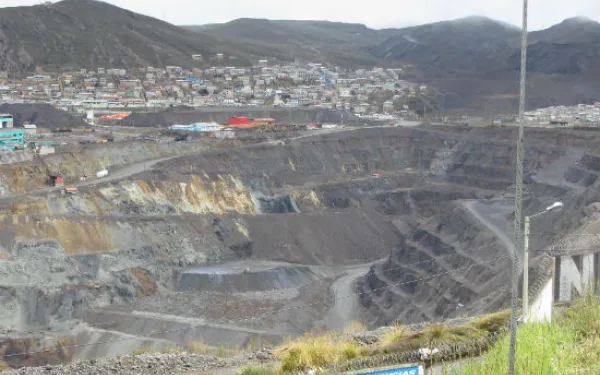
Peru and its socio-environmental conflicts
By María José Veramendi Villa, legal advisor, AIDA, @MaJoVeramendi “In Peru, the general state of social conflict is strongly influenced by the dynamics of economic growth that the country has experienced in recent years; but this growth has not necessarily brought measures that generate a perception of social welfare or political representation for certain sectors of society. ” (Ombudsman’s report No. 156: Violence in social conflict, March 2012) Peru is rich in minerals and other natural resources. Evidence of this is that as of June 2012, 20.3% of the national territory was licensed for mining activities, according to a report by the Cooperación NGO based on data from the government’s Geological Mining and Metallurgical Institute (INGEMMET). In June 2013, the Ombudsman of Peru released its Monthly Report on Social Conflict No. 112 (in Spanish). The report lists 223 registered social conflicts: 170 of which are active (76.2%) and 53 latent (23.8%). While there was a decline in the number of conflicts from the previous month, the most significant and prevalent type of conflict was socio-environmental, of which there were 145 cases in June. Of those cases, 105 were in mining, 18 in hydrocarbons, eight in energy activities and four in forestry projects. The Ombudsman’s office defines social conflict as “a complex process in which different sectors of society, the state and the private sector have conflicting objectives, interests, values or necessities, and that these contractions can lead to violence.” Causes In the 2007 report Socio-environmental Conflicts from Extractive Activities in Peru (in Spanish), the Ombudsman´s office identified at least five causes of these conflicts: People’s justified fear that extractive activities like mining can potentially cause contamination; Communities feel vulnerable living in areas where these activities are being developed; People lack trust in the government’s ability to prevent the contamination and degradation of the environment where they live; Concerns that weak regulations and controls on extractive activities can cause contamination resulting in collateral damages to third parties, imposing higher costs on activities like agriculture, whose existence and development can be jeopardized by the decline in quality or quantity of available water; and The negative impacts of extractive activities. These causes are as pertinent today as they were in 2007. But the Peruvian authorities still appear to ignore the situation, and, in response, the justified fear of the population and the mistrust in the state worsen. A recent example: The implementation of prior consultation Convention No. 169 (in Spanish) of the International Labour Organization (ILO) came into force in Peru on February 2, 1995. Since then the country has been obligated to comply with its provisions, which enforce, among others, the right of indigenous and tribal peoples to be consulted onissues that affect them. The convention also states that these people, in a prior, free and informed manner, can participate in the processes to develop and formulate policies that affect them. According to the jurisprudence of the Peruvian Constitutional Court, the convention has constitutional status. Despite this, its implementation was non-existent to the point of being a systematically denied right in the country until August 23, 2011. That’s when the Peruvian Congress approved legislation on the right to prior consultation for indigenous and tribal peoples. The law was promulgated and published on the September 6, 2011, and it has been in effect since December of that year. The Rules of Procedure to apply the Law were issued on April 3, 2012 and put into force a day later. But these legal instruments, which could be seen as an act of good faith to implement norms that already exist in our legal system, have been heavily criticized for technical failures and for reducing the standards of protection achieved by indigenous people through their many years of struggle. These protections were cemented in the ILO Convention No. 169 of 1989, the United Nations Declaration on the Rights of Indigenous Peoples (2007) and in the jurisprudence of the international bodies set up to protect human rights, especially the Inter-American Court of Human Rights I want to highlight two facts on these shortcomings: First, the Rules of Procedure of the Consultation Law only applies to acts conducted after its approval. This means that during the 16 years between the approval of Convention No. 169 and the Consultation Law and its Rules of Procedure, the former was merely a decorative instrument. The second little-known fact is that the Judgment 00025-2009-PI/TC (in Spanish) of the Constitutional Court states specifically: “The enforceability of the right to consultation is linked to the implementation of the ILO Convention 169 in our legal system." Government officials (in Spanish) have signaled that the Law of Prior Consultation is not binding. Even the Peruvian president said the law “should be viewed as an instrument allowing investment, and to not to be seen as an obstacle.” We remember that in the case of The Kichwa Peoples of Sarayaku Vs. Ecuador, the Inter-American Court of Human Rights ruled that proper consultation is a general principle of international law. It’s time to be alert. The proper implementation of the right to consultation and prior, free and informed consent is the key to developing effective protection of indigenous rights. In a country where socio-environmental conflict is the norm – along with the causes mentioned above, it is essential to build trust and confidence among the population and give assurances that their rights will be safeguarded. If these points are not put into action, it would be no surprise to see a surge of conflicts in future.
Read moreThe city, our ecosystem
By Haydée Rodríguez, legal advisor, AIDA We are witnessing the biggest wave of urbanization in history. More than half of the world’s population lives in cities. The United Nations Population Fund (UNFPA) estimates that five billion people will live in urban zones by 2030 (State of the World Population: 2007).This growth could bring opportunities to improve our lives and fight for environmental sustainability, or it could create more poverty and accelerate the destruction of natural resources. When we talk about the environment it’s easy to imagine a lush greenlandscape or a sunny beach, birds singing and perhaps an animal running free in the forest. It is less likely to visualize a cityscape of asphalt, traffic and honking horns. But it is true that the urban environment also is an ecosystem. Urban ecology: The natural order of cities Urban ecology is a relatively new scientific discipline that seeks to understand how ecological processes function inside urban areas. Unlike other branches of ecology, it requires the collaboration of the social sciences and economics to understand the dominant species of this environment: the human being. In the city, just like in other ecosystems, every aspect contributes toward its definition. The characteristics of urban habitats include traffic, air pollution, population density, movement patterns, the real estate market, infrastructure, transport and natural elements like the availability of clean water, topography and geographic location. Everything surrounding our everyday life – the streets, pavements, parks, buildings, etc. – have been created by humans. The documentary Urbanized analyzes the design challenges in cities, the interaction between different elements and how the environment influences the population. Watch Urbanized trailer. Source: YouTube Beyond chaos: Building sustainable cities Initiatives to promote sustainable cities are on the rise. In the United States, where approximately 250 million people live in urban areas, local governments have created a project called Star Communities - Sustainability Tools for Assessing and Rating Communities (STAR). Through the initiative, each municipality can evaluate the sustainability of their cities in areas ranging from infrastructure to equity and empowerment. Cities can volunteer to join the project by using the methodology for measuring sustainability developed by a multidisciplinary group. To be considered sustainable, STAR requires cities to: 1) Think and take action as a collective system; 2) Be resilient, which is defined as the city’s ability to adapt, recover and evolve in a changing environment; 3) Promote innovation and creativity; 4) Measure the progress of the health and welfare of the people, the environment and the economy; 5) Use resources in a responsible and sustainable way; 6) Collaborate between cities and inpiduals; 7) Promote equity and persity; 8) Inspire leadership; and 9) Seek continual improvement. There is no stopping the progress of growing cities. In Costa Rica, for example, there are ongoing projects like Enamórate de tu ciudad (Fall in love with your city), which aims to improve the quality of life of residents in San José, the capital. Strategies have been put in place to improve safety, promote forms of clean public transport such as bicycles, and hold activities that bring the community together to enjoy the urban environment. City lights shine increasingly brighter across the world. Now is the time to think about what we want our cities to be like. Our urban ecosystem can be an important opportunity for social mobilization (a social process organized and based on dialog to improve our quality of life), education and the empowerment of the population. It can also help us reduce our impact on natural areas and on biopersity. We should seize this positive challenge and dare to see our cities with new eyes.
Read more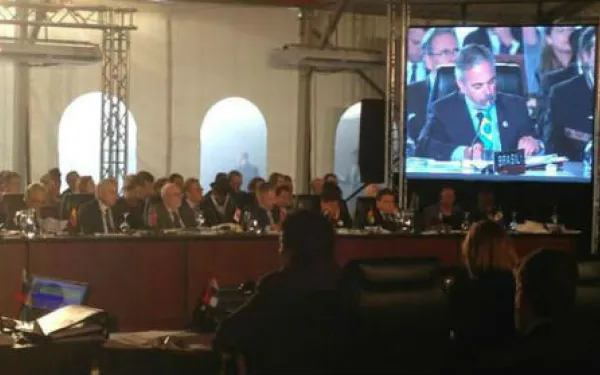
An evaluation of the OAS General Assembly and its relationship to the environment
By Astrid Puentes Riaño, co-executive director, AIDA, @astridpuentes The first week of June every year, the General Assembly of the Organization of American States (OAS) – made up of the foreign affairs ministers of its 34 member states – meets to discuss and address the hemisphere’s priority issues. For 2013, the central theme was: “For a comprehensive policy against the world drug problem in the Americas.” The city of Antigua, Guatemala hosted the June 4-6 event. In addition to the central theme, relevant administrative issues were addressed such as the election of commissioners to the Inter-American Commission on Human Rights (IACHR) and the approval of two conventions against discrimination and in favor of tolerance. This year, as in 2012, I had the honor of attending the assembly as a civil society observer. My objectives this year were: 1) to monitor the process of “strengthening” the Inter-American System of Human Rights (IASHR) which ended at the extraordinary assembly last March, and 2) to participate in the process of including an environmental focus in the debate on drug policy by contributing AIDA’s experience in monitoring the programs to eradicate coca and opium poppies in Colombia (1999-2007). These are my conclusions on the event from four different angles: What turned out well J The Assembly Declaration on the need to evaluate the so far failed drug policy: The states recognized the policy’s negative impacts on both the environment and human rights as well as the importance of taking them into consideration in future solution initiatives. The "Inter-American Convention against Racism, Racial Discrimination, and Related Forms of Intolerance" and "Inter-American Convention against All Forms of Discrimination and Intolerance" were adopted and opened for signature. We hope both conventions are ratified, upheld and implemented by all of the states in order to eradicate actions that threaten the dignity and life of any person. The culmination of the process of “strengthening” the IASHR that started in 2011: As regards this issue, I will limit my comments to recalling that far from strengthening the system, the proposals from certain states threatened to weaken it (please see my previous post). In March, important reforms to the IACHR were agreed on and will be applied beginning in August. Although those changes were not in force, certain states sought additional ones. Given that a state of constant reforms is destined for failure, it was positive that for the moment the states did not agree to make new revisions to the IACHR or to the Inter-American Court of Human Rights. Another positive element was the frank and open dialogue (though at times difficult) held by the states, IACHR, the Inter-American Court, civil society and other system users. There were many issues that remained outstanding, but the important thing is to strengthen dialogue in which the users of the IASHR and interested parties can participate effectively, and in which the real protection of human rights is the only guide. With regard to the election of the IACHR commissioners, the six candidates presented their proposals on May 1 in a forum held by the Permanent Council. Despite the inappropriateness of the chosen date – the hemisphere (excepting the northern part) was celebrating International Workers’ Day (also known as May Day), we listened to the candidates (all men this time) and learned about their perspectives regarding the IACHR. This should be a systematic practice in all OAS elections. What I did not like The lack of clarity and interruptions in spaces assigned to civil society: I recognize that progress has been made toward the greater and more significant participation of this sector in the OAS even though the mechanisms are still far from being perfect. Two examples in the assembly in Antigua, which we hope do not recur in the future, illustrate this: 1. During the civil society dialogue with Mr. José Miguel Insulza, secretary-general of the OAS, one state representative took the floor. Regardless of the subject of this intervention, this goes against the definition of the space, which is open only to the OAS secretary and civil society delegates. This is a point that requires immediate improvement. 2. In the dialogue between civil society and the foreign secretaries, the situation became complex. It is customary that, due to the short amount of time available for interventions (a total of 20 minutes this time), the organizations decide beforehand the issues and speakers. On this occasion, a group of organizations insisted on taking the floor even though their issue had not been chosen. Despite this, one additional person was given the floor without previous coordination or agreement. Although this was an attempt to air the perspectives of a diverse group, as is civil society, it opened the possibility of delegitimizing the efforts of hundreds of organizations to organize ourselves, if you’ll pardon the repetition. In addition, this incident brings with it the risk that organizations or individuals whose issues have not been selected by the rest but who are close to the foreign ministries may participate more than others. What was left pending… Obtaining greater participation from other sectors of civil society such as indigenous peoples, campesinos and Afro-Descendants. Nevertheless, in contrast to the past, this time there was a greater presence of the latter group, which represents a positive step. Providing continuity to the urgency of getting the states to renew and demonstrate their will to comply with IASHR decisions. This issue, I feel, is the white elephant in the room. Although that is a part of the recommendations of the Working Group that the states themselves developed in order to “strengthen” the System, none of them have mentioned the matter again and it is not included in the resolution that put an end to the process even though it is fundamental for truly strengthening the System. This assembly unfortunately demonstrated yet again the lack of transparency in the selection of the commissioners. Despite the redeemable elements of the forum mentioned above, each country’s participatory and transparent selection processes were absent. During the assembly, the traditional mechanism was once again applied in which each state nominates and campaigns for its own candidate. This lends itself to the diplomatic negotiation of votes that in the end are secret, thereby reducing the accountability to which we all have a right to with regard to those who govern us. The best part ☼ Without a doubt, the venue: Antigua. The people are incredibly friendly. It is a very pretty city that with great reason was declared a World Heritage Site by UNESCO. It is full of gorgeous little corners, colonial architecture and houses with balconies and gardens. Imposing mountains surround it – among them, Volcán de Agua [Water Volcano], at only 3½ kilometers from the city. I was able to enjoy a perfect and inspirational view on the mornings when I ran very early to clear my mind and stay abreast of the important, though a bit slow for my taste, discussions. The opportunity to share closely with respected individuals such as María José, my colleague at AIDA, and colleagues from organizations from throughout the region with whom it was a pleasure to meet again. The foregoing is my view of the recent OAS General Assembly. I would enjoy hearing your comments in agreement or disagreement with what I have said.
Read more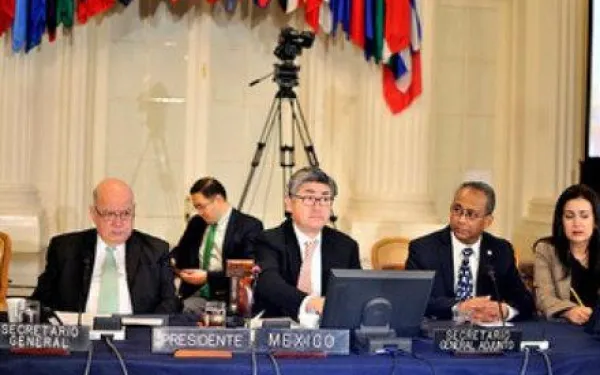
What’s the latest on the reform of the Inter-American System of Human Rights?
By Astrid Puentes Riaño, co-director, AIDA,@astridpuentes In June, I wrote about how some OAS member states had begun a process to introduce tough reforms on the Inter-American Commission on Human Rights (IACHR) and the Inter-American Human Rights System that would weaken their ability to operate and protect our human rights. I want to bring you up to date on how the discussions are faring. More importantly, though, I want to ask you to get involved by signing thepetitionto ask the member states to strengthen –not weaken– the Inter-American System. More than 3,000 people have already signed! You can sign too! Watch our video message to the Permanent Council of the OAS (Spanish only) The outlook last June was pretty thorny. Seldom has an OAS General Assembly been as tense as the last two, particularly the most recent one when the Inter-American System came under fierce attack and several member states even sought to re-establish it. The Assembly ended with a call to reform the statute at an Extraordinary Assembly, something that’s never happened in the history of the IACHR. The good news is that the member states appear to have somewhat cooled their clamoring. There are more signs of a willingness to talk. The Representative of Brazil made reference to this change during the Permanent Council’s extraordinary session with civil society representatives, saying the confidence and opportunities for negotiations have improved. He said this process should lead to an outcome in which the underlying question of human rights takes precedence over procedural matters. Watch our video message to the Permanent Council of the OAS (Spanish only) It’s an honor that the representative quoted us. Now we have to see if this good message gets translated into action by, for example, addressing the IACHR’s requests on Brazil including those regarding the contentious Belo Monte dam. The Brazilian government must respond and give its perspective on the case. The not so good news is that the process is not yet complete. We’re still waiting for a definition on what the reforms will be and how they will be implemented. For example, part of the reform package proposed by some states is that if the Inter-American Court rejects a request for precautionary measures then the IACHR has to do so too. That, as we have said, fails to recognize the natural differences of the Court and the IACHR and puts them at risk. The IACHR has committed to producing various reports, which will eat up a lot of its resources and thus could affect its duty to protect, its duty to proceed with cases of human rights violations affecting millions of people in the hemisphere. It is understood that neither the Inter-American System nor any of those involved are perfect. There is still a lot to improve. But it is essential that this process concludes with recommendations to make the System more effective. That means that AIDA and our colleagues in the hemisphere will continue to lobby the member states, the OAS and the IACHR itself. We will continue to offer our opinions. We will continue to share our experiences as users of the System. We will continue to fight to prevent any weakening of the System. That is why we ask you to sign TODAY and help us defend the IASHR and, in the process, our human rights. If you as an inpidual or community member believe that you could use one of the IACHR’s decisions in cases involving dams, mining projects, tourism developments, free speech, the protection of women or anything else, then speak out and sign up now! If not you, if not us, then who? Full video of the session In this recording you can hear the Representative of Brazil cite AIDA (last 5 minutes)
Read more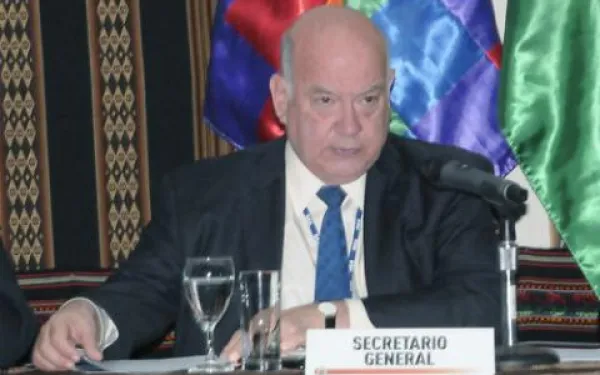
Who can protect us if the Inter-American System of Human Rights is weakened?
By Astrid Puentes, co-director of AIDA, @astridpuentes I’m writing from Cochabamba, where I’m attending the 42nd General Assembly of the Organization of American States (OAS). This is the first time I have come to Bolivia and to a General Assembly. I am here to support our efforts to truly “strengthen the Inter-American System” and to stand against proposals from OAS member states that could limit the independence and effectiveness of the Inter-American Commission on Human Rights (IACHR). Our goal is to preserve the autonomy and role of the IACHR, and, thus, to guarantee human rights in the region: To protect our rights, yours and mine. Here’s a summary of what is a complex story. A number of member states launched an effort to strengthen the Inter-American System of the Protection of Human Rights in 2011, two years after the IACHR and the Inter-American Court of Human Rights modified their rules of procedure. This effort is a direct response from several member states after the IACHR brought up concerns about human rights in their countries. A working group was then created last year to evaluate how the Inter-American System of Human Rights could be “strengthened.” The group produced a report that the Commission has responded to and that NGOs like ours will also comment on. A few days ago, the Secretary General of the OAS, José Miguel Insulza, published a report on the subject. Personally, I think it is inadequate because several of his recommendations will actually weaken, and not strengthen, the system. For example, he says there is “a loophole in the statute of the commission on the figure of the precautionary measures that could be filled by... the General Assembly of the OAS.” It is worth mentioning that it is the IACHR that determines its own rules, a way to ensure its independence. Insulza’s report left out issues he’d been asked to address, such as options for improving the financing for the Inter-American System. Based on his recommendations, the result would be contrary to the same objective that Insulza and member states have set as their main goal. Fortunately, Insulza in his declarations during the General Assembly dismissed some of the recommendations that could have drained the strength of the Inter-American Human Rights System. The important points of the “strengthening” process that will be discussed at the General Assembly in Cochabamba – and no doubt afterwards – include: Financing the Inter-American Human Rights System. This is essential, as you can’t ask the IACHR to operate efficiently on a meager budget. “Unify in a constructive manner” what the member states and the IACHR understand as the precautionary measures. This is an issue presented by some member states and brought up by Secretary Insulza. It was frankly a surprise that this point came from the very report of the secretary for two reasons: a) abiding by what the system dictates is part of what member states already agreed to in creating the System, and b) because the Inter-American Court has been very clear in determining that the measures are obligatory. What can we expect of member states? I mean, who likes to get their dirty laundry published in the media? This is not to say that they are acting irrationally. Whether the IACHR should have a greater role in promoting human rights than protecting them. That is to say, whether it should provide more advice to the member states on how to respect human rights, or rather review complaints of human rights violations that come its way. Pulling Ears To understand this process it is important to know the motivations that have prompted member states to push for these changes. Coincidentally, states like Brazil, Colombia, Ecuador, Peru and Venezuelawant “to strengthen” the system precisely when the IACHR has handed down important decisions against them, namely: 1. It has called on Brazil to suspend construction of the Belo Monte dam in Brazil for violating indigenous rights and threatening the environment, 2. The Report on Democracy and Human Rights in Venezuela exposed serious violations, 3. The severe human rights violations in Colombia have been included a number of times in Chapter IV of the commission’s annual report, 4. Ecuador has been questioned multiple times by the Special Rapporteur for Freedom of Expression, among other examples. A Conflict of Interests If we put this differently and speak instead of member states but of a director whose organization is about to hire a close relative, there would be no doubt that this would be declared incompatible because of a conflict of interests. Or, put even more plainly, if a referee was assigned to the final of the World Cup of Soccer and he had the same nationality as one of the teams, then obviously there would be protests from the other team. These impediments don’t exist in the OAS. The same member states against whom the complaints are made by the IACHR can modify its functions through the General Assembly. It is exactly for this reason that restraint is required even when they don’t agree with the System’s decisions. It is vital that the states respect the independence of the Inter-American System in discourse and practice. They must reiterate their compromise with the agreements dating back more than 60 years and support the bodies that were created for the very purpose of guaranteeing justice in cases of human rights violations. (This text in Spanish)
Read morePrior consultation: An opportunity for life, respect and diversity
By Héctor Herrera, legal advisor, AIDA, @RJAColombia Colombia’s ethnic groups have decrees and laws that protect their cultural persity, that defend the individual and collective livelihood of these native and traditional peoples and communities. Article 6 of Convention No. 169 of the International Labour Organization (ILO) stipulates that indigenous peoples have the right to prior consultation. That means that they should participate in defining the measures that could have a direct impact on them, whether legislative (such as laws or decrees) or administrative (environmental permits for highways, dams, mines, oil wells, and the like). The negotiations should be carried out in good faith and with the goal of reaching agreements on all sides. This has become very important in Colombia, a multiethnic, multicultural, and diverse country. According to the Luis Ángel Arango Library, 65 indigenous languages in 12 language families are spoken in Colombia, of which 34 have less than one thousand speakers. Traditional Afro groups speak two different Creole languages. Yet all of these languages are in danger. Colombia also is extremely diverse in biological species globally, ranking first in birds, second in amphibians and butterflies, third in reptiles, and fourth in mammals, according to the Humboldt Institute. Colombian newspaper El Espectador reported 2011 data showing that 10% of all biodiversity is found on 1% of the planet’s surface. In Columbia, 29.8% of this is collective indigenous territory and 5% is collective traditional Afro territory. Understanding this, prior consultation emerges as an opportunity to protect the cultural and ethnic persity of Colombia and defend the inpidual and collective livelihood of the many native and traditional peoples and communities. It is, too, an opportunity to protect the ecosystems that these ethnic groups inhabit as well as to protect life in all its forms. This does not mean forcing anybody to adopt a conservation, extractive, or development model. It simply means making sure that an effective space is provided for clear, honest, and intercultural dialogue with ethnic groups on measures that could affect them, whether legislative or administrative measures or national laws or extractive mining projects. This is completely in line with the stipulations of Article 6 of Convention No. 169 of the ILO . This right has also been recognized in numerous national and international legal documents. On the international level, we have the United Nations Declaration on the Rights of Indigenous Peoples, adopted in 2007 (PDF file). In Colombia, we have the Political Constitution, which protects the rights of ethnic groups to their collective territory and the rights of all of society to a healthy environment. With the backing of international legal documents and the Political Constitution, the Constitutional Court of Colombia upheld the right to prior consultation for the “Embera indigenous people” in relation to the construction of the Urrá dam in 1998 and for Amazon indigenous peoples on the fumigation of illegal crops in 2003. In other cases, the High Court declared unconstitutional the National Development Plan of 2006-2010, the forestry law of 2006 and the mining code reform of 2010 because the proponents had not consulted with ethnic groups. There are yet more cases outside Colombia, such as Bolivia with the Multinational Constitution of 2009 and Ecuador with the Intercultural and Multinational Constitution of 1998, both of which recognize the right to prior consultation. So too Peru, where a law on this right was just passed this year. Culture, language and a view of the world – all of these can live on through time if we respect them and guarantee people’s rights, including the right to prior consultation. The protection of this right could also contribute to the protection of important ecosystems and of biological persity, both of which are vital issues as we face unprecedented climate change and environmental degradation.
Read moreEnvironmental law and women
By Natalia Jiménez, legal advisor, AIDA The role of environmental law is weak on gender. This can be seen in Latin America where there is constant approval of economic and development plans affecting the female view of the world, and that could lead to new ways of violating our rights. Just like with ethnic communities, there are social groups with unique values of environmental protection, and to protect these ways of thinking is to protect the environment. Women play a decisive role in the protection of the environment in a distinct and particular way. While not the same for all and while many women may not feel the need for this recognition, the way of understanding nature or creation on the one side and environmental damage on the other is different between men and women. This is a reason why we promote a variety of proposals for environmental management. There are a lot of good books on this in Spanish. Here are three: a) “Abrazar la vida. Mujer, ecología y desarrollo,” by Vandana Shiva, published in Uruguay, b) “Desarrollo y feminización de la pobreza” and “Ecofeminismo: hacia una redefinición filosófico-política de ‘Naturaleza’ y ‘Ser humano,’” both by Alicia Puleo and published in Spain. >The experience of Ecuador in protecting the moor ecosystems> is >a beautiful and inspiring example of a female environmental fight in Latin America. It also is proof of what has been said, such as that >women are the best defenders in negotiations on climate change> and that >their ideas are even more effective and sustainable when it comes to fighting hunger and poverty>. But while ethnic groups have gained a good degree of legal defense through prior consent, numerous social groups are still waiting for creative lawyers with the capacity to defend their visions in the courts. Prior consent allows ethnic groups to make decisions about plans or legislative initiatives that affect their territories in order to protect their cultural, social, and economic integrity. It is a right that has been >recognized> in countries like Colombia. In Latin America, the social aspect that comes up most in big legal battles for environmental protection is the right of ethnic groups to prior consent over a development project that could damage their existence and culture. But little to nothing has been said in the courts on the illegality and social inconvenience of such a project violating women’s rights and their vision of the world. We need legal tools as jurisprudential precedents to make it possible to litigate and determine, for example, that a development plan is or could represent discriminatory action against women. I am not talking about multiplying the number of existing mechanisms for participation in decision-making or the number of women involved or making decisions. We need laws that set precedents to protect the environment based on the female view of the world. We need more creative legal tools that, like prior consent, can incorporate the environmental values of women into local and global environmental practices in a real and efficient way.
Read moreCoral reefs in Latin America: A natural spectacle at risk
Gladys Martínez de Lemos, legal advisor, AIDA Twenty five percent of all marine species have lived at some stage in coral reefs. In Costa Rica, these reefs are under threat from deforestation and other human activities. Coral reefs help maintain balance in the marine environment. They are home to many marine species for human consumption, they protect coasts from erosion and hurricanes, and they offer coastal communities a source of income from diving tourism. But a lack of clear policies and regulations is threatening their survival. These natural wonders help balance the ecosystem by providing a source of food to superior organisms, thus forming vital food webs. Their environmental value is so significant that economists have estimated that a hectare of reef is worth over one million dollars per year. Even though coral reefs cover about a tenth of the ocean floor, current estimates suggest that 25% of all marine species have lived in coral reefs at some stage of their life cycle. Despite this, coral reefs are under threat in Costa Rica and elsewhere from ocean acidification, destructive fishing practices, unsustainable coastal development, and pollution, among other factors. According to the Costa Rica's 15th State of the Nation Report, the loss of 75% of live corals in the Cahuita Reef is mostly due to sedimentation caused by basin deforestation and other human actions. Governmental inaction It's evident that coral reefs are endangered. There are no clear and widespread policies and regulations to deal with this issue; there are no mechanisms for the control, monitoring or even protection to preserve coral reefs. Even current international obligations on coral reef protection are overlooked. This can no longer be. Marine biodiversity and ecosystems must be preserved for future generations to see the beauty and diversity of coral reefs. We all have a son, nephew or cousin who we want to have the opportunity to enjoy the richness of the coral reefs, or the chance to savor fish and their valuable protein. Most Latin American countries and their decision makers have not yet created special laws to protect the coral reefs. They face a huge challenge -- and responsibility -- to protect the reefs.
Read more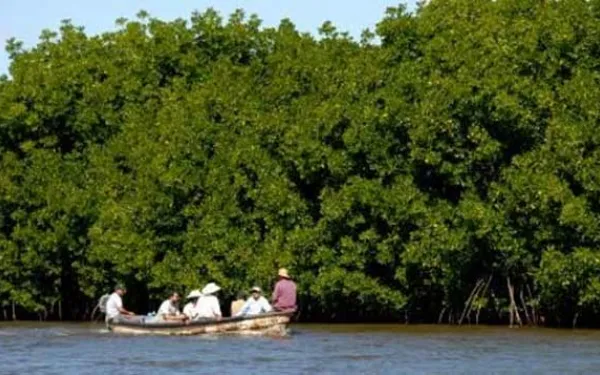
Protection of Sinaloa’s mangrove swamps put off
By Sandra Moguel, legal advisor, AIDA, @sandra_moguel Marismas Nacionales, the largest wetland in Mexico, is still at risk almost four years since the announcement of a proposed decree to protect it from threats such as major tourist developments. Mexico is the country with the largest number of sites designated as wetlands of international importance in Latin America and yet, surprisingly, these sites have not been looked after. By signing up to the Ramsar Convention[i], the Mexican government made a commitment to draw up plans for, defend and promote the wise useof these ecosystems, as well as to expand its system of protected areas[ii]. Marismas Nacionales is the largest wetland in Mexico, located between the states of Sinaloa and Nayarit. It has been a Ramsar site since 22 June 1995, which means it belongs to the international system for the protection and regulation of wetlands of international importance. The Recommendations of the Ramsar Advisory Mission from 2010 point out that although politically the ecosystem is pided into two different regions, ecologically the two sections of wetland have many things in common and therefore their management should be tackled as a whole. The federal government has already protected the Nayarit portion of the wetland, but four years since the publication of an official Announcement of Decree on the Sinaloa Marismas Nacionales Biosphere Reserve, the procedures for the creation of this Protected Natural Area, which would cover 47,556 hectares of mangrove forest, are yet to be completed. Meanwhile, the construction of massive infrastructure remains a threat to Marismas. The Pacific Coast Integrally Planned Centre – now known as Playa Espíritu (Spirit Beach) – and the Isla de Palma Development are both projects which put this site in jeopardy. The first of these projects has obtained environmental permission to build a 10,000-room resort (although the official proposal involved 44,000 rooms), while the second includes plans to construct accommodation for 200 guests, located in a nuclear zone according to the Sinaloa Marismas Nacionales Biosphere Reserve. The Mexican Secretariat of Environment and Natural Resources (SEMARNAT) justified its authorisation of the Integrally Planned Centre project explaining that the site had not been designated as a Protected Natural Area (or ANP by its Spanish acronym). It is currently studying the environmental impact study on the Isla de Palma development, but it is entirely possible that the argument of the effect it will have on a mangrove area and the habitat of highly migratory birds will not be enough to reject the application for environmental permission. In its Sectoral Program for the Environment and Natural Resources 2007-2012, the federal government promised to increase the total area of land designated as belonging to Protected Natural Areas from 22 million hectares in 2007 to 25.6 million in 2012. But how can this conservation objective be realised if the sites which are expected to be declared Protected Areas at the end of the six-year program have not been “protected”? The declaration of the Sinaloa Marismas Nacionales Biosphere Reserve is not the only decree of its kind to have been delayed: it is much the same story for La Sierra La Laguna and Balandra in Baja California Sur, Santuario Madera in Chihuahua and Ejido el Palmito in Sinaloa, to name but a few. The lack of coordination amongst administrative entities and the disparate organs which make up the environmental sector, combined with insufficient planning instruments such as ANP decrees, prevent decision-making which would favour conservation. Putting off these decrees is unjustifiable regardless of the fact that SEMARNAT’s legal department is swamped with ANP justification studies needing to be examined, or that there may be political reasons for delaying their approval. Issuing a decree on Sinaloa Marismas Nacionales is one way of guaranteeing the constitutional right to a healthy environment, as well as fulfilling international obligations such as Ramsar. It also protects the economic activities of the communities which depend on this ecosystem. [i] Ratified by Mexico on 20 December 1984 and published in the Official Gazette of the Federation on 24 January 1985. [ii] Resolution IX. 22 of the Ramsar Secretariat on wetlands and systems of protected areas, 9th Meeting of the Conference of the Contracting Parties, Uganda, 8-15 November 2005.
Read more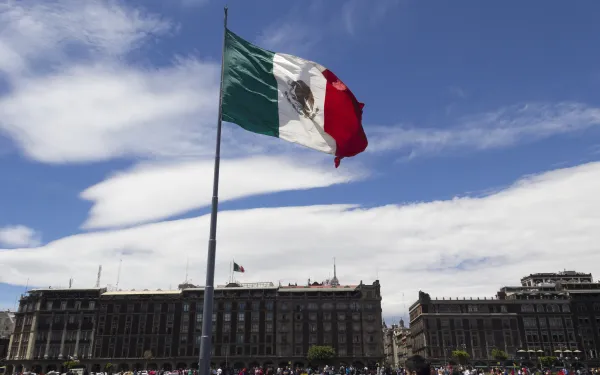
Mexican Constitution protects human rights
On June 9, 2011, Mexico rewrote history. The Mexican Congress approved revisions that expressly recognize human rights in the national constitution for the first time. The new language requires all authorities to adhere to international human rights treaties Mexico is a signatory to when those treaties are more expansive than the "individual guarantees" currently on the books. As modified, Article 1 of the constitution now recognizes human rights in general and incorporates international law. This means groups such as AIDA and communities in Mexico will have better legal tools for defending the right to a healthy environment or clean drinking water. Or, for example, because indigenous communities’ right to free, prior, and informed consent is granted in international law, Mexico will now have to recognize this right. Moreover, although the Mexican constitution already recognized some rights, enforcement has been difficult. The revision provides additional legal tools and thus raises hopes for enhanced protection of those rights. These constitutional changes came after a four-year process initiated by the UN Office of the High Commissioner for Human Rights in Mexico, and involving academics, nongovernmental organization, and independent experts. AIDA contributed by evaluating existing legal tools for protecting human rights as well as international legal obligations. In 2008, the Mexican Congress started considering the human-rights-related constitutional revision, which was finally partially approved in June, 2011. While the Mexican Congress and government should be applauded for its vision, the constitutional change’s effectiveness remains to be seen. Recognizing human rights is only the first step, and the new commitment will mean little without compliance. In coordination with our allies in the country, AIDA will monitor Mexican cases to ensure enforcement of this profound advancement and improved protection of the right to a healthy environment.
Read more